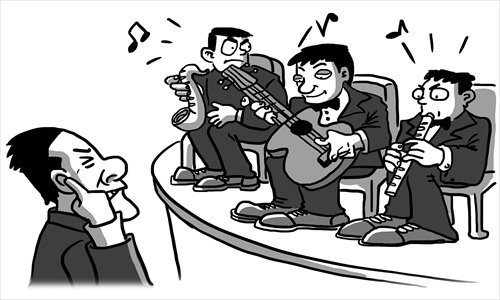Teamwork unappealing to me-first generation of Chinese kids

When the San Francisco Symphony (SFS) offers concerts in Beijing and Shanghai during its six-city Asia tour next month, there will be many parents and their children among the audience. And the four members of the 104-person orchestra born on the Chinese mainland may attract some extra attention because they represent the dream of these children and parents.
There are 40 million children studying Western instruments in China, and the vast majority will be hoping to one day play on the stage in such a concert tour. But the reality is that most of them will be disappointed. Yes, there is Lang Lang and Wang Yujia. But the international stage for soloists is limited and crowded.
To join the orchestras may be even harder for many Chinese children. This is not only because of the sharp competition at auditions but also because of the skill imbalance of Chinese music students.
Liu Yunjie, the Shanghai born Associate Principal Viola of SFS, travels back to China every now and then to train music students. "Chinese kids are good at solo skills but they don't know how to play orchestra," Liu told me.
Liu, who trained as a child in China himself, blames the music education there. "Teachers and parents all focus on solo techniques, because this way you can attend competitions, win awards and gain personal fame. And the skills of playing in a team are overlooked. It is true in my generation and it is still true now."
The lack of teamwork skills among Chinese can be seen in various fields from the lukewarm interest of kindergarten kids in participating in group games to the disappointing record of the national soccer teams over the years.
And this is shown more clearly when the Chinese move to the US, a country that highly values teamwork.
US schools emphasize group discussions and team sports. Chinese children often show little enthusiasm when they participate.
US foundations like to encourage social service organizations to team up to apply for funding together. Organizations in Chinatown often disagree with one another and are rarely able to form a team.
In US elections people are encouraged to consolidate their support behind one candidate representing their views. But in the Chinese community, there too often is more than one candidate chasing the same position and no one want to compromise for the interests of the community. And they end up all losing because of diluting the ballots from Chinese voters.
This all may sound perplexing. The Chinese culture is traditionally known as a collective one. And US culture seems to be the opposite by encouraging individualism and emphasizing personal interests.
But the cultural differences may be the very reason that contributes to the contrast.
In her book Raise an A+ baby: education tips for children under six, which is written in Chinese and newly published in Chinese mainland, Gisela Jia, assistant professor in psychology at Lehman College of the City University of New York, lists teamwork as one of the major traits a kid should be taught in early years.
When I asked Jia, who grew up in China, about the differences between the Chinese and the Americans in teamwork, she offered her observations from an US kindergarten.
One example is when kids share crackers from the same box. Each kid takes out a cracker and then passes the box to the next one, and eventually every kid gets a cracker quickly.
"This can easily happen in an individualism society where everyone clearly knows their individual needs and the best way to fulfill these needs, which is to make sure the streamline goes smoothly. In other words, they know that the interest of the team is directly associated to the interest of themselves," said Jia.
"But in our collective society, people may not have such awareness. And we don't know what we want so we often wait for someone else to tell us what to do. This is really quite dangerous," she said.
It may raise a few eyebrows to still define China as a collective society these days. At least, young Chinese are known for their eagerness to show their unique colors. Customized outfits and hairstyles, stunts on the Internet and suspicion of the authorities have become the signature symbols of a new generation.
But a journalist friend in Beijing pointed out that there is a huge difference between being self-centered and individualism, and young people in China are closer to the former than the latter.
If true, the growing self awareness among young Chinese may not be helpful in building their teamwork skills. Self-centered people, after all, may know neither what they want nor the best way to get it, and they are likely to insist others pay for their confusion.
The author is a New York-based journalist. rong_xiaoqing@hotmail.com